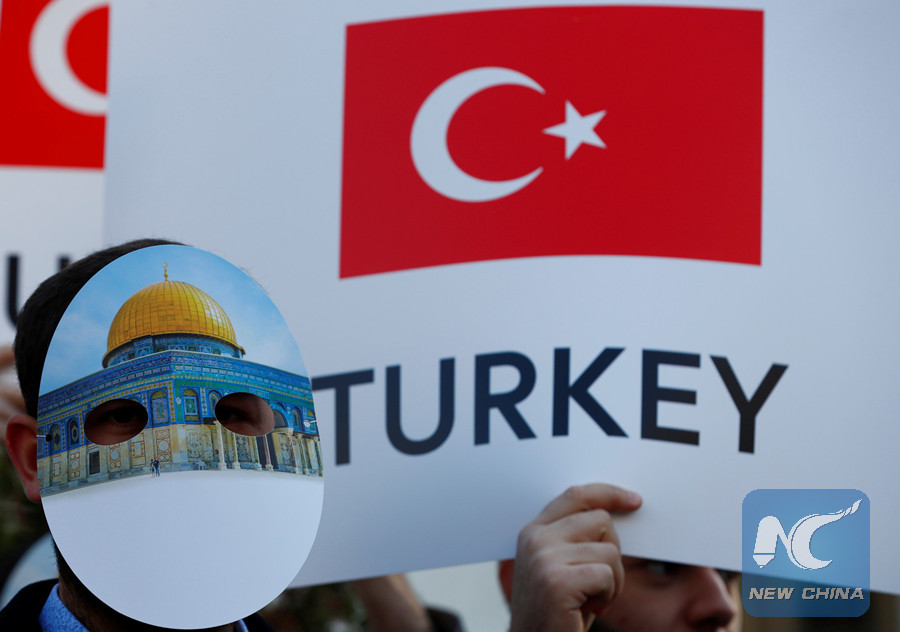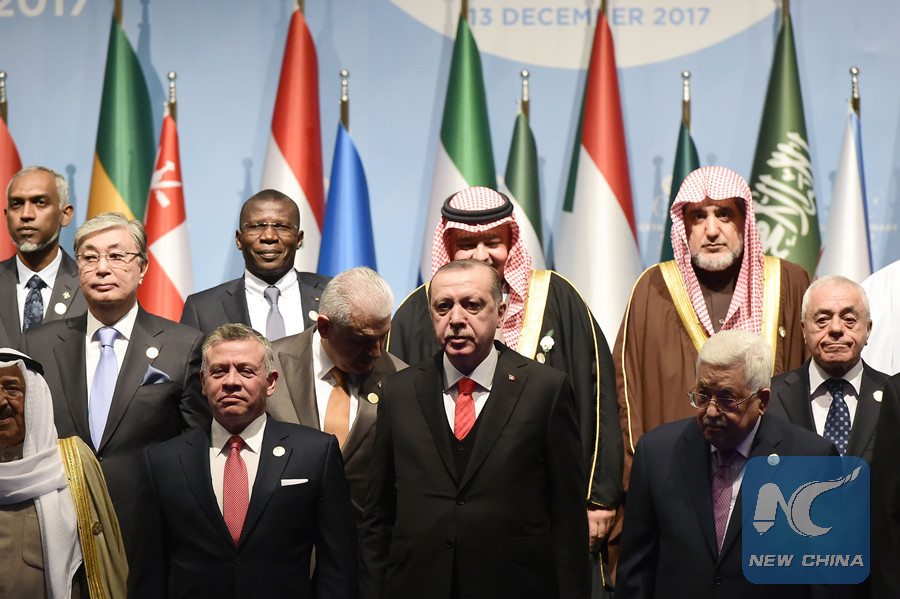
A man wearing a mask with an image of the Dome of the Rock takes part in a Pro-Palestinian demonstration near the Istanbul Congress Center as the leaders and the representatives of the Organisation of Islamic Cooperation (OIC) member countries gather for an extraordinary meeting in Istanbul, Turkey, December 13, 2017. (REUTERS PHOTO)
ISTANBUL, Dec. 13 (Xinhua) -- As representatives of Islamic countries met in Istanbul on Wednesday over how to respond to the U.S. recognition of Jerusalem as Israel's capital, Turkey is not expected to take concrete actions against Israel through severing economic or military ties, analysts told Xinhua.
"I do not expect Turkey's President Erdogan to go as far as taking economic or military measures against Israel," said Yasar Yakis, a former Turkish foreign minister.
Turkish President Recep Tayyip Erdogan has kept blasting Israel ever since U.S. President Donald Trump announced on Dec. 6 his decision to recognize Jerusalem as the Israeli capital and move the U.S. embassy from Tel Aviv to the holy city.

Turkish President Tayyip Erdogan (front row, C) stands next to Jordan's King Abdullah (L) and Palestinian President Mahmoud Abbas (R) as they pose for a group photo during an Extraordinary Summit of the Organisation of Islamic Cooperation (OIC) on last week's US recognition of Jerusalem as Israel's capital, on December 13, 2017 in Istanbul. (AFP PHOTO)
Erdogan has even threatened to cut off diplomatic ties with Israel, in addition to labeling Israel as a "terror" and "invading" state and vowing to fight until a Palestinian state is established with East Jerusalem as its capital.
Israel occupied the eastern part of Jerusalem, or the Old City with some holy sites, and some other territories from neighboring Arab nations in a six-day war in 1967. Since then, the UN Security Council has passed resolutions describing the Israeli presence in East Jerusalem as occupation.
For Turkey, severing economic ties with Israel would be detrimental to Ankara's own national interests under the current circumstances, argued Yakis.
The Turkish economy has been suffering from a big chronic current account deficit, high inflation and unemployment as well as fewer foreign funds in recent years.
"Turkey has neither the economic nor political, diplomatic or military capacity to implement sanctions against Israel," observed Cahit Armagan Dilek, director of the Ankara-based 21st Century Turkey Institute.
But Turkey's ambassador to Israel might be temporarily recalled for consultations with a view to appealing to voters, added Dilek.
The Turkish public, in particular voters for the ruling Justice and Development Party, has always been quite sympathetic toward the Palestinian cause.
Jerusalem is considered sacred not only by Jews, but also by Muslims and Christians, as the city is historically and religiously important for all the three religions.
Ankara is not expected to give up military cooperation with Israel either, since such a move would risk harming its own military capabilities.
One of the areas of military cooperation with Israel is related to Turkey's Airborne Warning and Control System (AWACS) military aircraft, with Israel being the provider of electronic warfare and intelligence systems for the AWACS.
Giving up such projects would be to Turkey's detriment, said Dilek, a former staff officer in the Turkish military.
For its part, Turkey contributes to Israel's defense through a radar facility installed in the eastern part of the country.
The NATO radar facility in the town of Kurecik in Malatya Province has been in use since early 2012. It is known to be part of an air defense system aimed essentially at protecting Israel against ballistic missile attacks by Iran.
Noting the radar facility in Kurecik is a NATO project, Dilek said, "Turkey can't decide to shut it down on its own."
Some feel Erdogan's harsh rhetoric against Israel may be aimed more at pleasing the public at home.
Israel declared Jerusalem as its undivided capital in 1980, but all countries have continued to keep their embassies in Tel Aviv so far.
Like Turkey, many countries favor a two-state solution to the conflict between Israelis and Palestinians, with East Jerusalem as the capital of an independent Palestine State.
Kemal Kilicdaroglu, leader of Turkey's main opposition Republican People's Party (CHP), suggested on Monday that Erdogan's harsh remarks against Israel were actually for show only.
"Go ahead and cut off ties. We are also behind you. Talk is cheap," Kilicdaroglu said in parliament, calling on Erdogan to act on his words.
The CHP leader also argued that Erdogan should actually direct his criticism toward the U.S. rather than Israel, given that it is the former that took the decision.
Turkish-Israeli ties went through hard times after Israeli troops killed 10 Turkish activists on a ship carrying humanitarian aid to Gaza back in May 2010, but bilateral trade continued to soar in the wake of the deadly incident. The two countries signed a deal to normalize relations in June last year.
"If economic relations were not affected in such a grave case, one may presume that they will not be affected because of Palestine either," remarked Yakis.
Turkey is among the few Muslim countries which have sharply raised their voices against Israel following the U.S. decision.
Stressing that Jerusalem is a red line for Muslims, Erdogan said it would again be Muslims who would save Jerusalem from the oppression it has suffered.
The land on which Israel sits was, like several others in the region, under the rule of the Ottoman Empire until the First World War, while Turkey is the heir to the empire.
In response to the U.S. decision, Erdogan called for an extraordinary summit of the Organization of Islamic Cooperation (OIC) for Wednesday in Istanbul, as Turkey holds the rotating chair of the 57-member group.

Pro-Palestinian demonstrators shout slogans near the Istanbul Congress Center as the leaders and the representatives of the Organisation of Islamic Cooperation (OIC) member countries gather for an extraordinary meeting in Istanbul, Turkey, December 13, 2017. (REUTERS PHOTO)
Erdogan suggested ahead of the OIC summit that Ankara may take some steps against Israel following the meeting, expressing hope that the gathering would represent a turning point in the tension.
The analysts, however, do not feel the summit would bear much fruit given the divergencies within the Islamic world at the moment.
Referring to the fact that the Arab League simply called on the U.S. to drop its decision without any condemnation, Dilek said the OIC meeting should be considered unsuccessful unless it recognizes a Palestinian state with East Jerusalem as the capital.
Arab foreign ministers met last weekend in Cairo and announced that the Arab League would seek a U.N. Security Council resolution against the U.S. move.
"The most likely outcome of the OIC meeting will be a strongly-worded statement blaming Israel, but no action," said Yakis, who served as a diplomat for long years in Arab countries.
He noted that the OIC summit is taking place at a time when some leading Arab nations are at loggerheads with each other or bogged down in deep crises.
Ankara's harsh criticism against Israel may be appealing to the man in the street in Turkey and Arab countries, but runs the risk of turning Israel against itself.
Before striking a deal with Israel to mend ties, Erdogan said early last year that Turkey and Israel needed each other in the region.
Israel and Turkey may cooperate on the transfer to Europe of the natural gas Israel is hoping to extract from fields in the Mediterranean in the years to come, as Ankara is devoting efforts to make it an energy hub.
In response to Erdogan's remarks, Israeli Prime Minister Benjamin Netanyahu has hit back, saying Erdogan is in no position to teach him a lesson in ethics as his government has been bombing Kurdish villages in Turkey, putting journalists in jail, helping Iran evade sanctions and supporting terrorists.

